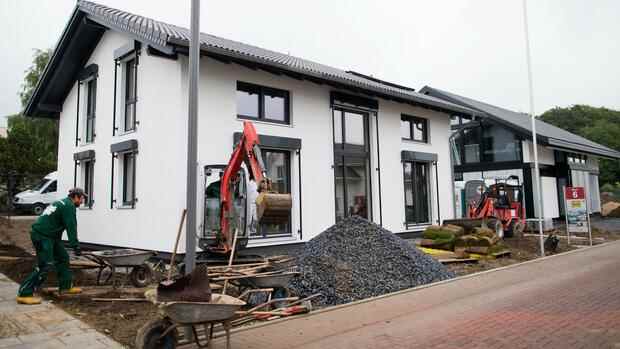Numerous builders – whether private or institutional – included promotional funds from KfW in their cost calculations. It is unclear whether they will also receive this in the future.
(Photo: dpa)
There is probably no other political decision by the new government that has caused so much bewilderment and anger among the population as the decision to stop its KfW funding program for energy-efficient buildings. And for a good reason. After all, this decision is not only made by professional project developers who, when marketing their real estate, had firmly planned for the subsidies and cheap loans that the state gives to private customers. Thousands of private home builders also included the support in their financing.
The announcement by the new federal government in November that the program for the construction, purchase or refurbishment of efficiency houses in accordance with Energy Standard 55 would expire at the end of January caused hectic activity: Across the country, professional and private builders tried to find the right time before the deadline collect the relevant documents and send off your application.
One would have expected that a veritable flood of applications had sloshed through KfW since November. But what one could not expect was the reaction of the new federal government: They announced the immediate end of the subsidy, even before the actually announced end of the period. And not only those who wanted to collect support for the energy standard 55 at the last minute are affected by the sudden action of the federal government. Because it also froze the other programs at the same time.
Thousands of builders now have to consider whether they can postpone their project in the hope of still unknown follow-up programs – or whether they have to recalculate and possibly be less energy-efficient during construction, because climate protection is expensive after all.
Top jobs of the day
Find the best jobs now and
be notified by email.
>>Read here: What the KfW shock means for consumers and real estate prices
From the point of view of the federal government, the stop may make sense. The intention behind it, to promote more stringent energy standards than the now widespread standard 55, also makes sense.
lost trust
Still, the decision is a debacle. Because the federal government has lost the trust of the real estate industry and owners, which they urgently need if they want to be climate-neutral by 2045.
After all, according to the Federal Environment Agency, real estate is responsible for 30 percent of CO2 emissions in Germany. If you want to reduce emissions, you have to ensure that climate protection is given more consideration in new construction. But it is not possible without a comprehensive renovation of the existing building.
And for that you need homeowners to remodel and refurbish their buildings at great expense – and do it with full confidence that they will not be caught unawares by unexpected government volatility.
More: “It won’t get any cheaper” – What investors can expect on the housing market in 2022
